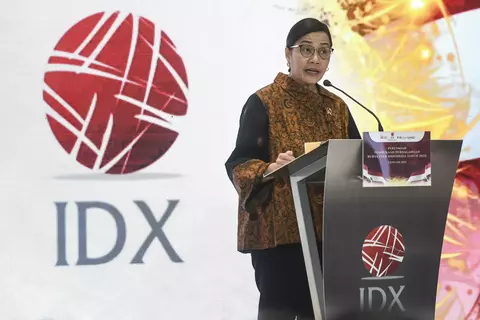
Sri Mulyani Acknowledges Rising Deficit Challenges in Early 2024
Businessicy – Finance Minister Sri Mulyani acknowledged on Thursday (01/02/2025) that the first half of 2024 posed significant economic challenges, although the government successfully maintained control over the annual budget deficit.
Tax revenues saw a notable decline of 7.9% year-on-year, amounting to Rp 893.8 trillion ($55.1 billion) by mid-year, according to the Ministry of Finance. This downturn added pressure to fiscal stability during a period of global economic uncertainty.
“The first half of 2024 was tough,” Sri Mulyani remarked during the ceremonial opening of the first trading day of 2025 at the Indonesia Stock Exchange (IDX) building in Jakarta. “Our tax revenue declined sharply at the time, but by August, we managed to see a light at the end of the tunnel,” she added, expressing cautious optimism about the recovery trajectory.
The capital market also reflected these economic strains, with the IDX Composite Index hitting its lowest point in 2024. The decline underscored challenges faced by investors as global and domestic factors dampened market sentiment.
“Samsung Foldables: Small Upgrades Expected”
The fiscal year 2024 presented Indonesia with significant challenges and milestones, including hosting the world’s largest single-day election in February and regional elections in November. These major political events, coupled with climate-related pressures, required swift and strategic government action to stabilize the economy and support vulnerable communities.
In the first quarter, Indonesia faced severe climate challenges that impacted the agricultural sector. The government responded by disbursing assistance to farmers, including subsidized fertilizers, to mitigate losses and sustain food production.
Finance Minister Sri Mulyani highlighted the government’s proactive measures to address these challenges while reflecting on the year’s fiscal performance.
“But praise be to God, we wrapped up the year with a fiscal year report that is better than what we had earlier estimated,” Sri Mulyani stated during a press briefing. “State revenue began to recover in the second half. We ramped up spending on elections, capital relocation, and social assistance to alleviate climate change risks. Public spending has helped mitigate the impact,” she added.
The increase in public spending provided much-needed relief, not only for election logistics and the country’s capital relocation project but also for climate mitigation efforts. These expenditures supported economic resilience during a year marked by revenue fluctuations and environmental challenges.
Finance Minister Sri Mulyani announced that Indonesia concluded the 2024 fiscal year with a significantly lower budget deficit than initially projected. Speaking during a press event, she emphasized that the government’s fiscal discipline and strategic adjustments played a critical role in achieving this positive outcome.
“The government had initially raised the fiscal deficit cap from 2.29 percent to 2.7 percent, anticipating heightened expenditures for elections, capital relocation, and climate assistance,” Sri Mulyani said. “However, we successfully ended 2024 with a budget deficit well below 2.7 percent, reflecting prudent financial management and strong revenue recovery in the second half of the year.”
She highlighted that this healthier-than-expected budget position provides a strong foundation for the 2025 fiscal year. “We have ended 2024 with a relatively healthy and safe budget report,” she stated. “This can become a strong asset for us to welcome the 2025 fiscal year with greater confidence and stability.”
The government’s ability to maintain a lower deficit was achieved despite significant fiscal pressures, including the world’s largest single-day election in February, regional elections in November, and climate-related challenges. Public spending on key areas—such as subsidized fertilizers for farmers, election logistics, and climate change mitigation—helped address these challenges while stimulating economic activity.
This fiscal achievement reflects Indonesia’s commitment to balancing economic priorities with social and environmental needs. By effectively managing public expenditures and maintaining fiscal discipline, the government not only stabilized the economy in 2024 but also laid a robust foundation for sustained growth in 2025.
“The Complete Information From Wikipedia About Government Budget Balance”